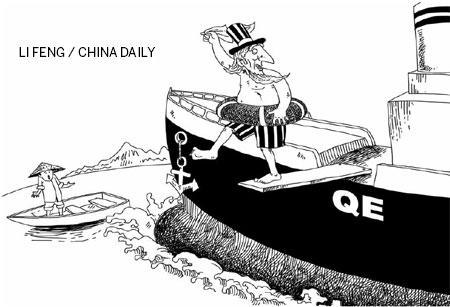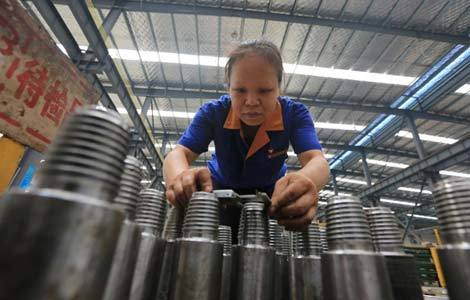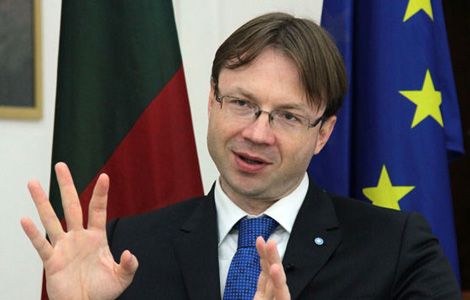Prepare for exit-QE shockwaves
Updated: 2013-07-16 07:15
By Mei Xinyu (China Daily)
|
||||||||

The three main economic issues discussed at the fifth Sino-US Strategic and Economic Dialogue in Washington last week were increasing bilateral trade, facilitating structural reforms and enhancing cooperation in financial markets. The most important financial issue for the world's two largest economies, however, is how to deal with the possible effects of the withdrawal of the US' quantitative easing (QE) policy.
The US economy is showing signs of stable recovery. In 2012, the housing market performed much better, with the Federal Home Loan Mortgage Corporation (Freddie Mac) making a profit of $10.98 billion, the first since 2006. The employment rate, too, has improved in the US.
Besides, the impact of QE on the US' economic recovery is waning and its ill-effects - creating a property bubble - is becoming more evident by the day. That's why the US might taper it off. But the tapering off of the QE policy could trigger huge capital flows and lead to another debt crisis - just like its introduction did - and the emerging market economies will be first to suffer its impact.
Repercussions of the US' economic policies across the globe abound in history. In 1971, following the Nixon Shock - a series of economic measures taken by the US including the decision to unilaterally cancel the direct convertibility of the dollar to gold - the main Western economies entered into a competition to devalue their currencies that led to a decade of "running inflation". Since the interest growth rate lagged behind the currencies' depreciation rate, the effective interest rate from 1975 to 1980 was zero - while from 1970 to 1980 it was 0.4 percent and the London InterBank Offered Rate from 1974 to 1977 was below zero.
Some countries, including those ideologically opposed to the Western world, tried to exploit the "opportunity" offered by the Nixon Shock. For instance, the Soviet Union made the use of foreign capital a national strategy, introducing $17.661 billion of Western capital during its Ninth Five-Year Plan period (1971-1975). Of the total foreign capital, 82.3 percent was introduced in the last three years of the plan period.
But the feast ended when former US Federal Reserve chairman Paul Volcker adopted a tight monetary policy in 1979, and the resulting high interest rates prompted former German chancellor Helmut Schmidt to remark that they were the "highest interest rates since Jesus Christ". The US' annual interest rate rose from 6.8 percent in 1976 to 18.9 percent in 1981, while the LIBOR increased from 6 to 14.3 percent during the same period.
The result: in 1982, Mexico found itself incapable of repaying foreign debt. And heavily indebted developing economies like Brazil, Mexico, Argentina and Venezuela "lost ten years" of development, triggering a global debt crisis. Poland had already seen the founding of the Solidarity labor union in 1980, which led to a change in regime not only in Warsaw, but the entire Eastern Bloc.
Many emerging economies today have accumulated enough debt and face enough risk to derail their economic and social development, and even threaten their stability. During the rest of this year, some emerging economies could witness social unrest because of economic difficulties and probably fall into the same trap that dragged communist countries from prosperity to debt in the 1980s.
Changes in monetary policies of the US and other strong Western economies, together with falling prices of primary products, may cause the hidden dangers to surface. If the US tapers off the QE policy within this year, the reverse capital flow could deal a deadly blow to China and emerging economies.
From the crisis of the 1980s to the 1994 Mexican financial crisis, we have seen how developed countries' tight monetary policies produce disastrous results in developing countries. The financial shockwaves for the past two months suggest that a similar crisis could be repeated.
In the 1980s, China was lucky enough to narrowly escape the debt crisis. Today, when emerging economies account for almost half of its trade volume and account for huge capital flows into the country, China has the potential to escape another financial crisis.
But let us not forget the famous remark of John Connally, treasury secretary under former US president Richard Nixon: "The dollar is our currency, but your problem." Therefore, China should be prepared for the possible shockwaves caused by the withdrawal of the QE policy, because it will have severe impact on its economy, as well as on the rest of global economy.
The author is a researcher at the Chinese Academy of International Trade and Economic Cooperation, affiliated to the Ministry of Commerce.
(China Daily USA 07/16/2013 page12)

 Obama urges restraint amid protests
Obama urges restraint amid protests
 Putin wants Snowden to go, but asylum not ruled out
Putin wants Snowden to go, but asylum not ruled out
 Apple to probe death of Chinese using charging iPhone
Apple to probe death of Chinese using charging iPhone
 Investment falters as industrial activity flags
Investment falters as industrial activity flags
 Rape victim's mother wins appeal
Rape victim's mother wins appeal
 Reproduction of 'Sunflowers' displayed in HK
Reproduction of 'Sunflowers' displayed in HK
 Land Rover enthusiasts tour the world
Land Rover enthusiasts tour the world
 US star sprinter fails drug test
US star sprinter fails drug test
Most Viewed
Editor's Picks

|

|

|

|

|

|
Today's Top News
Spain apologizes to Bolivia for plane delay
International cotton contract in the works
Smithfield shareholder still presses for break up
China calls for new talks on Iran nuclear issue
Global warming may largely raises sea level
Putin wants Snowden to go, asylum not ruled out
US: China can balance own growth
Top foreign study destinations for Chinese
US Weekly

|

|






